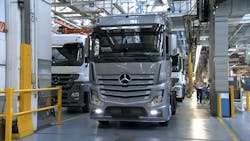With all the new developments in the area of alternate fueled vehicles, the term “in production” has been heard a lot more often than usual. But what does in production actually mean? In the course of working on our recent white paper, Defining Production, we identified more than a dozen definitions.
Here is how the term in production is defined:
- 1st vehicle off low rate production tooling, limited option content available
- 1st vehicle off high rate production tooling, limited option content available
- 1st vehicle off high rate production tooling, robust option content available
- 1st commercially sold vehicle but with limited trained field support and limited parts availability
- 1st commercially sold vehicle with substantial trained field support and robust parts availability
- Low rate production line at factory, factory ramping assembly training and supply chain
- Full rate production line at factory, factory staff trained, supply chain fully operational
- 1st commercially leased vehicle, with intent to retrieve and replace vehicle with later version
- 1st commercially leased vehicle with full service life
- 1st vehicle to be ordered via the production ordering process
- 1st vehicle but requiring frequent software updates and recalls to service centers
- 1st vehicle with stable software configuration and no recalls
- 1st vehicle in customer commercial use, low uptime
- 1st vehicle in customer commercial use, high uptime
It can be confusing for a fleet to know exactly what a manufacturer means when it says a vehicle is in production, because different companies use different definitions of the term.
Fleets need to understand that when it comes to producing a vehicle there are dramatically different situations for traditional OEMs vs new ones, including things such as established development processes, revenue needs, variations of product offering and the acceptable level of risk.
Getting a new truck to market is a complex activity involving a number of parallel and interrelated activities and milestones, gradually growing in maturity over the course of the product’s development.
Fleets need to make sure they understand what a truck maker — whether it is one who has been making trucks for decades or one of the companies that is new to the trucking scene — means when they say their truck is in production.
It would be great if the industry could standardize on a definition, but I don't really see that happening. Therefore, fleets should feel free to ask the truck makers exactly which definition they are using when they say their truck is in production. Feel free to use some of the definitions we discovered during our research to get the answers you need in order to help make the right decisions about where to invest your time and money.
About the Author

Michael Roeth
Executive Director
Michael Roeth is the executive director of the North American Council for Freight Efficiency. He serves on the second National Academy of Sciences Committee on Technologies and Approaches for Reducing the Fuel Consumption of Medium and Heavy-Duty Vehicles and has held various positions with Navistar and Behr/Cummins.
